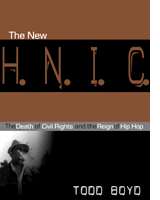
After a bit of foreplay, Todd Boyd launches headlong into the made-to-provoke thesis of The New HNIC: that hip hop has displaced “the pious, sanctimonious nature of civil rights as the defining moment of Blackness.” Boyd — a professor of critical studies at USC’s film school — wants to free hip hop from the pop-culture ghetto and claim it as a movement, with political and social might.
It’s a shame, then, that the sharp commentary that abounds in this volume is overshadowed by this drive-by shooting of a sacred cow. Because when it comes down to it and Boyd says as much in the conclusion — his “words are not intended as a diss of civil rights,” but rather as a loving shout-out to the growing power of hip hop. “It is an ideology. It is a mode of being,” he writes. And “no matter how much you want to dismiss it, it’s still here” after 25 years.
The rest of The New HNIC mounts a convincing and entertaining case that hip hop matters. As an art form, it represents a remarkable shift, Boyd writes, because it “didn’t need to be repackaged in Whiteface to be consumed by the masses.” The runaway success of acts from NWA to Lauryn Hill gives truth to the words of rapper Jay-Z: “We brought the suburbs to the hood.” And it’s not just the ‘burbs — Boyd makes clear hip hop’s reach is now global. Boyd’s best essays address the intersections of hip hop and politics. Indeed, his reading of Bill Clinton (dubbed by Toni Morrison as our first black president) as the Head Nigga in Chief, tripped up by the envious, playa hatin’ likes of Newt Gingrich and Bob Barr, is nothing less than inspired. And not to fret; Boyd also provides a glossary of hip hop’s contributions to the vernacular — from “bling bling” to “playa” to “wack” — and thoughtfully confronts his own use of the word “nigga.”
Above all, Boyd praises hip hop culture for “keepin’ it real” — for refusing to mask the diversity, the divides, or the warts of black culture. Hip hop is “the good, the bad, and the ugly of contemporary Black life in America,” he writes, “and in so being is the movement most equipped to handle the weight of Blackness in these times of such contention.”















